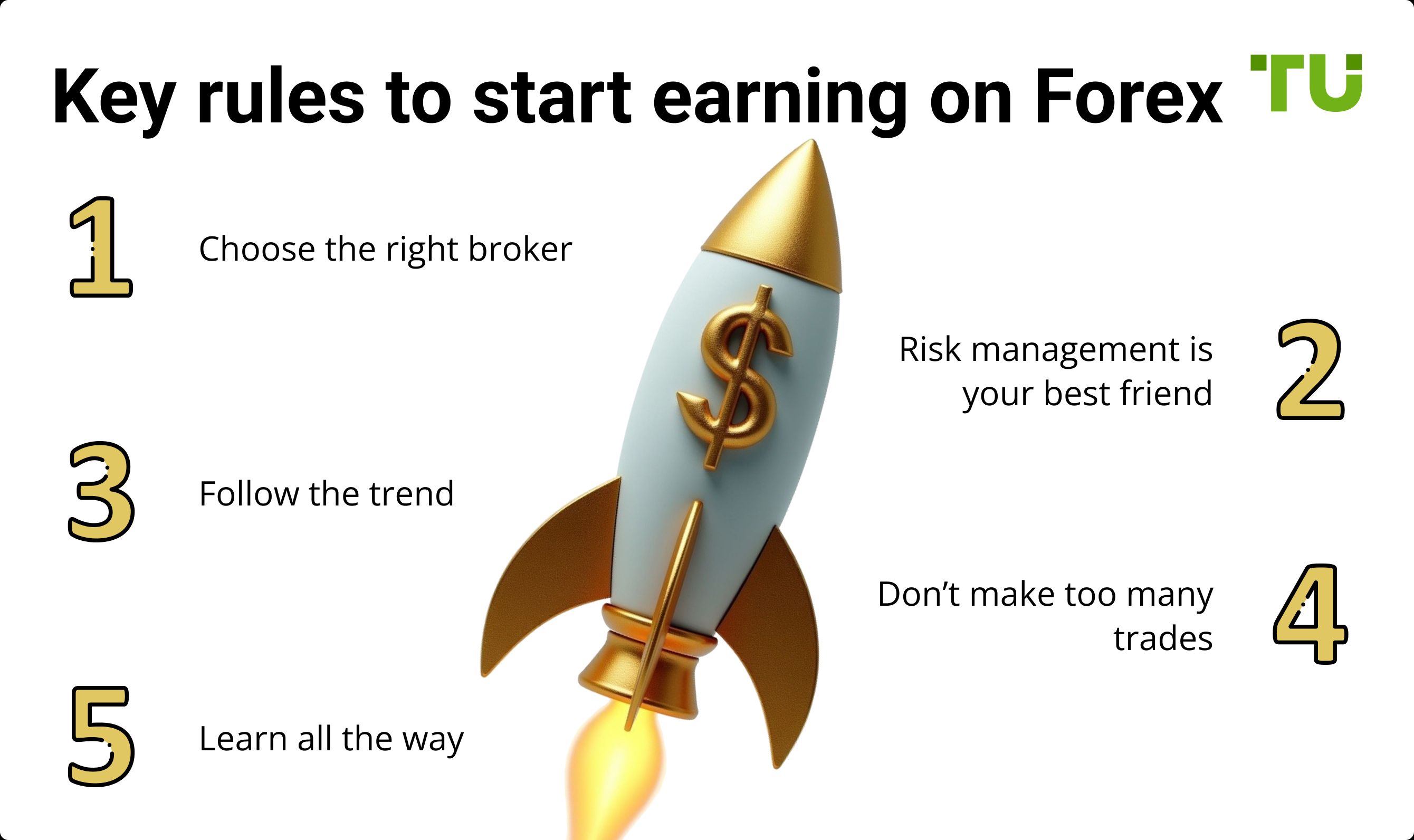
Is Forex Trading Worth It?
Yes, Forex trading is worth it. This is the most liquid market in the world, with a daily turnover of over $7.5 trillion. It offers high profit potential but comes with significant risks due to market volatility. While it offers the potential for significant profits, the reality is that most retail traders — approximately 70–80% — lose money due to lack of experience, poor risk management, or emotional decision-making. Success depends on continuous learning, discipline, and a well-planned trading approach.
The market offers abundant opportunities for strategic traders to earn significant profits. However, success requires dedication, market knowledge, and selecting the right broker to support your trading goals.
If you’re new to Forex trading or seeking expert advice on how to begin, Traders Union provides valuable insights, market analysis, and trading tips to help you get started.
Is Forex trading a good investment?
Yes, Forex trading is a good investment for those who understand its risks and rewards, but it is not a guaranteed way to earn money. Returns depend on currency movements, and success requires skill, strategy, and discipline.
The Forex market is highly liquid and operates 24/5, offering opportunities for profit due to frequent price fluctuations. Traders can use leverage to amplify their potential gains, but this also increases the risk of significant losses. Economic data, geopolitical events, and market sentiment often drive sudden price changes, making the market unpredictable.
Many traders find it challenging to consistently profit in Forex trading due to its volatility and the complexities of timing the market. A solid understanding of market trends, risk management, and emotional control are essential for success. While Forex trading can be lucrative, it is best suited for those with experience or a willingness to learn thoroughly before investing.
Is Forex trading actually profitable?
Forex trading, the exchange of currencies on the global market, offers the potential for significant profits. However, achieving consistent profitability is challenging and requires a deep understanding of the market, disciplined strategies, and effective risk management.
Profitability statistics
- Low success rates. Studies show that only about 15% of Forex traders are consistently profitable, while the remaining 85% either break even or experience losses.
- High failure rates. Some reports indicate that up to 90% of Forex traders lose money due to various market complexities.
Factors influencing profitability
- Market knowledge. A thorough understanding of Forex markets, including economic indicators and geopolitical events, is crucial. Lack of knowledge often leads to poor trading decisions.
- Trading strategy. Successful traders develop and follow well-defined trading plans that outline entry and exit points, risk tolerance, and profit targets. Deviating from a plan can result in impulsive decisions and losses.
- Risk management. Implementing strategies such as setting stop-loss orders and avoiding over-leveraging helps mitigate potential losses. Poor risk management is a common reason for trading failures.
- Psychological discipline. Emotions like fear and greed can negatively impact trading decisions. Maintaining emotional discipline is essential for long-term success.
To succeed in Forex trading, choosing the right broker is essential. We've carefully selected a list of trusted brokers known for their reliability, low spreads, and efficient trading platforms.
Forex market strengths
The Forex market, being the largest and most active financial marketplace, has several core strengths that set it apart from other trading environments. Here are its key strengths:
Global market reach
- The Forex market connects major financial hubs worldwide, including New York, London, Tokyo, and Sydney.
- This global presence ensures continuous trading, making it the only market that operates 24 hours a day during weekdays.
Market liquidity
- With over $7 trillion traded daily, the Forex market is unmatched in liquidity.
- This high liquidity allows for quick trade execution, reducing the risk of market manipulation and ensuring tight spreads.
Decentralized trading network
- Unlike stock exchanges, Forex trading occurs through a global network of banks, brokers, and financial institutions.
- This decentralization enhances market resilience and reduces the risk of trading interruptions.
Currency diversity
- Traders can access a wide range of currency pairs, from major pairs like EUR/USD to exotic currencies like ZAR/JPY.
- This variety offers opportunities for diversification and hedging against economic or geopolitical risks.
Economic sensitivity
- The Forex market reflects real-time economic events such as interest rate changes, inflation reports, and political developments.
- This sensitivity ensures dynamic price movements, providing opportunities for speculation and profit.
Technological advancement
- Cutting-edge trading platforms, algorithmic trading, and AI-based market analysis tools have enhanced the Forex trading experience.
- These advancements increase efficiency and empower traders with data-driven insights.
Risk management tools
- The market supports advanced tools like stop-loss, take-profit, and margin trading.
- These features help traders manage risk effectively, even in volatile market conditions.
Institutional and retail participation
- Both institutional players and retail traders participate actively, ensuring diverse market perspectives.
- This broad participation stabilizes the market and prevents monopolization by a few entities.
Economic growth indicator
- The Forex market acts as a real-time barometer of global economic health.
- Currency strength reflects a country’s economic stability, making Forex an essential tool for policymakers and investors.
Is Forex market difficult for private investors
The Forex market presents both opportunities and challenges for private investors. While its accessibility and potential for high returns attract many, navigating this complex market is far from easy. One of the primary challenges is dealing with market volatility. Currency values fluctuate due to global events, economic indicators, and central bank policies, creating unpredictable trading conditions that require constant attention.
Additionally, the high leverage offered by brokers can amplify profits but also magnifies losses, making effective risk management crucial. Many private investors struggle with insufficient trading capital, often leading to overleveraging in an attempt to maximize returns. This approach can backfire when even small market movements result in significant losses.
Another hurdle is the steep learning curve. Successful Forex trading demands a deep understanding of technical and fundamental analysis, economic trends, and global politics. Investors who dive in without this knowledge often find themselves overwhelmed. Emotional decision-making also plays a critical role, as fear and greed can lead to impulsive trades and costly mistakes.
Lastly, the psychological toll of Forex trading is substantial. The fast-paced environment, coupled with the pressure to make quick decisions, can be mentally exhausting. For private investors, success in the Forex market depends on continuous learning, disciplined trading strategies, and emotional control, transforming these challenges into opportunities for long-term growth.
Is Forex trading worth to make it a full-time job?
Forex trading can be worth pursuing as a full-time job for skilled and disciplined individuals, but it is generally better suited as a source of additional income due to its high risks and unpredictability.
Building a full-time career in Forex requires extensive knowledge, consistent strategy, and the ability to manage emotional and financial risks. While the freedom to work autonomously from anywhere is appealing, the volatile nature of the market makes it difficult to achieve steady, predictable earnings. Many traders struggle to maintain consistent profits, especially in the early stages.
For most, Forex trading is better as a side project or a supplementary income stream. Starting small allows beginners to gain experience while minimizing risks. Additionally, passive income opportunities, such as copy trading or PAMM accounts, enable less active participation while still earning returns. Ultimately, whether to pursue Forex full-time depends on your risk tolerance, financial situation, and dedication to learning and practice.
5 rules to start earning money on Forex
 Key rules to start earning on Forex
Key rules to start earning on ForexThis multi-step algorithm to start trading is quite simple to implement.
Choose the right broker
The broker of your choice absolutely must be licensed and vetted for. They should also provide a wide range of services for novices in the Forex trading world and newbie traders in general. Your broker is going to be your initial point of success, so they must be able to help you from the very beginning.
Risk management is your best friend
Risk management is the foundation of all types of trading, not just foreign exchange trading. If a strategy doesn’t work initially, your risk management endeavors will help you preserve capital and reduce total losses.
It is not recommended that a beginner trader use a ton of leverage. Rather, it is necessary to set stop losses and not enter into a position for all of one’s funds. A broker will be able to help you develop a tried and true risk management plan for your accounts.
Follow the trend
For success in Forex trading, it’s vital to follow and grasp market trends. Because this is a global market, trends will come and go quickly in different sectors.
Educate yourself as much as possible on the Forex market and study different currency pairs and what tends to affect those pairs before risking your investment. This will take a lot of time, but this process will help you avoid losses.
Don’t make too many trades
It may be tempting to make a large number of trades at the beginning, but it’s best to avoid this as a beginner. Newbies to Forex trading should start with swing trading and other similar strategies that don’t involve a ton of trades. In the long run, this will make it easier to keep your emotions as a trader in check.
Learn all the way
Whether your venture as a Forex trader is short-term or an investment in a long-term career, you will never stop learning. It would be a good practice to keep a printed record of your trades that includes reasons for the trade to occur and factors that influenced your decisions. Also include possible entry and exit points.
Conclusion
Forex trading is an exciting, dynamic investment opportunity — but it’s not for the faint of heart. Its unmatched liquidity and round-the-clock operation attract traders from all over the world. Still, success in Forex demands knowledge, strategy, and strict risk management.
If you’re just starting out, it’s best to take your time — learn the ropes, start small, and use helpful tools like copy trading or Forex signals. I’ve come to realize that while profits can be impressive, they don’t come without risk. Enter this market with a plan, a cool head, and the flexibility to adjust when things change.
Post a comment